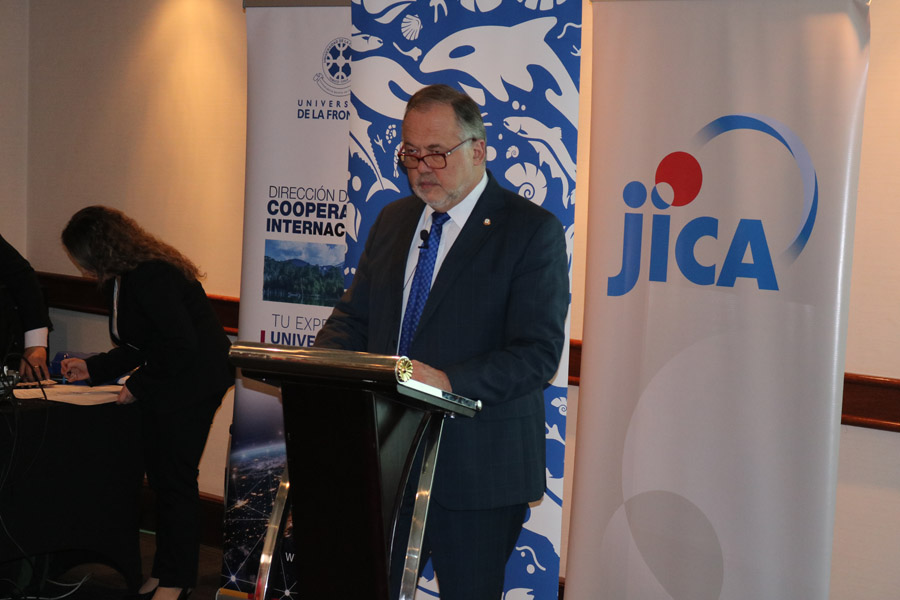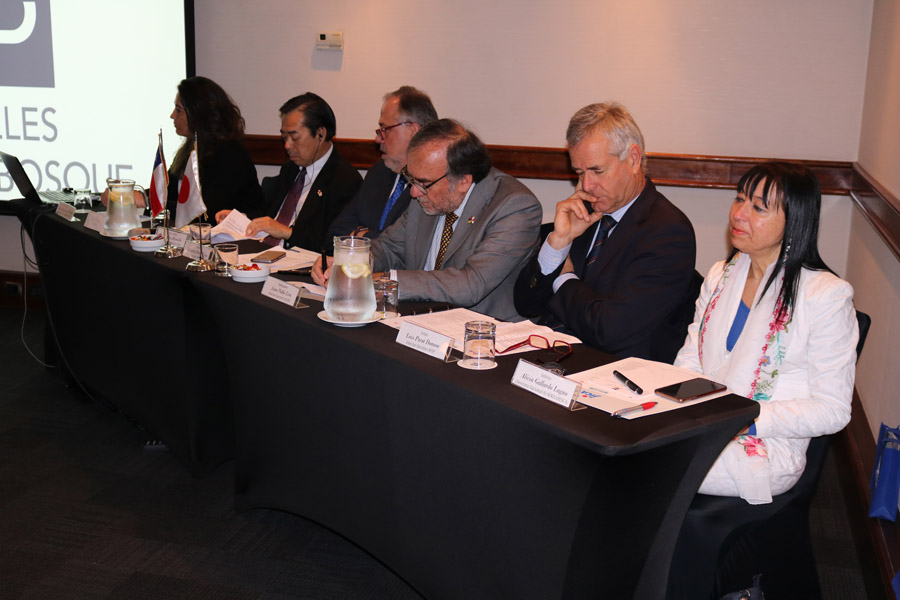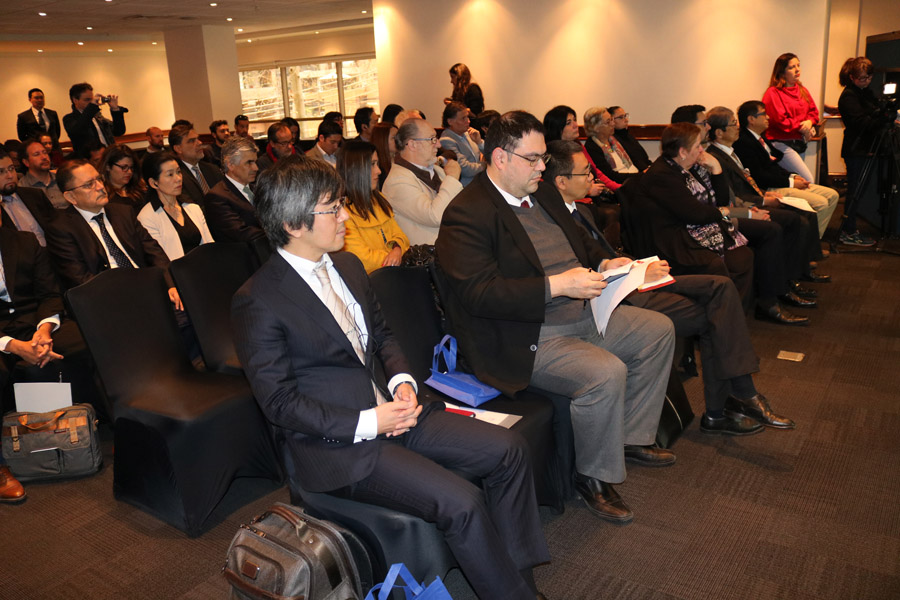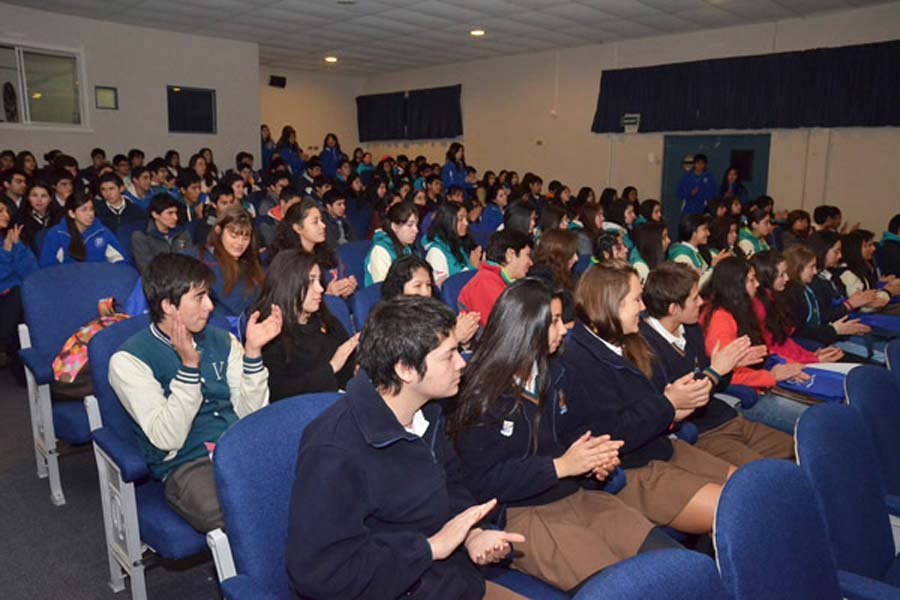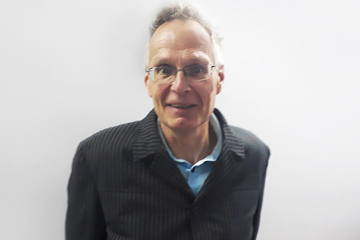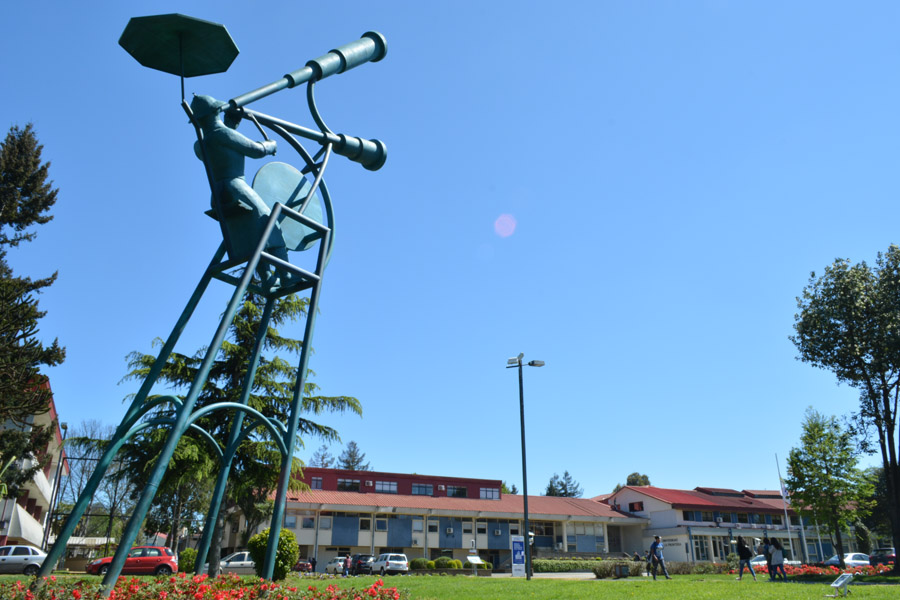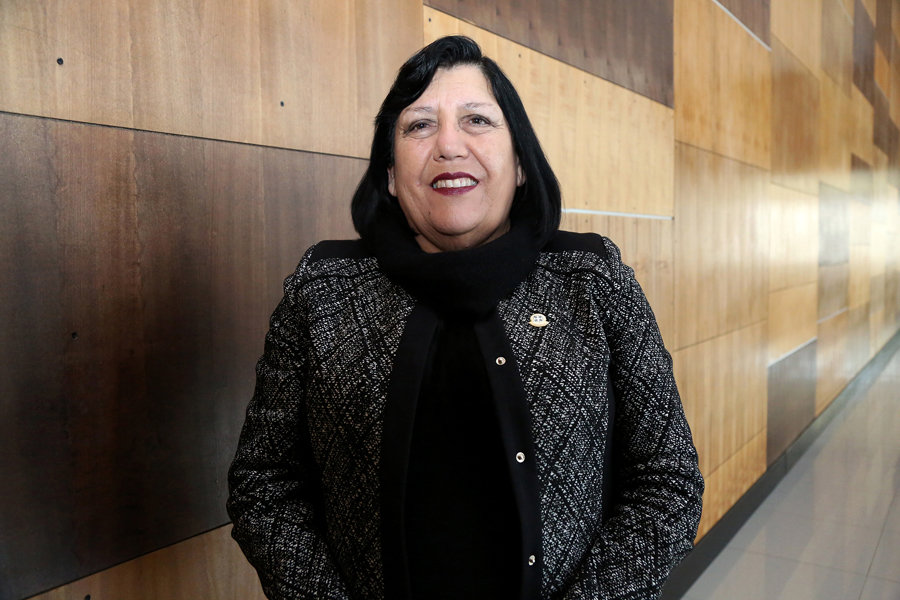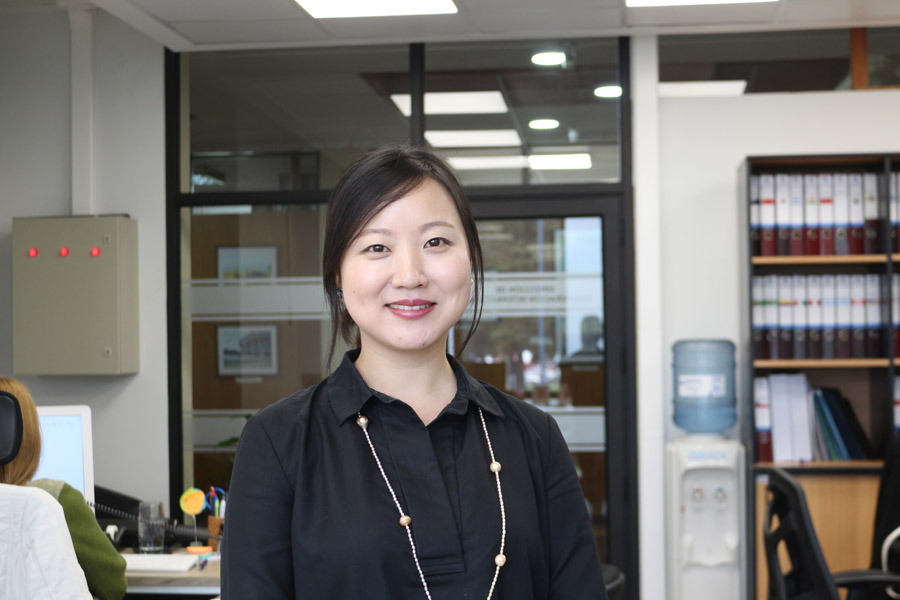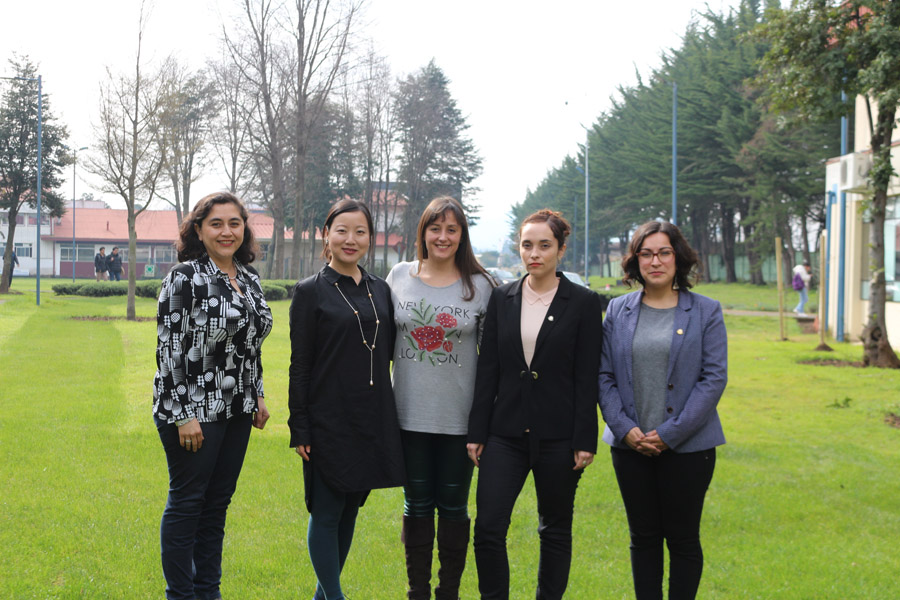|
Different authorities of the public sector and public and state institutions of both countries participated at the launch of the initiative which could benefit large part of the coastal sector in the south of Chile with its results. |
The Universidad de La Frontera is going to lead this unique research project, which will bring academics, institutions and companies of the private sector in Chile and Japan together, during the next five years. It is an initiative for the development of a red tide early alert system that allows to monitor, predict and detect the blooming of red tide in the south of Chile. The project is financed by the Japan Science and Technology Agency (JST) and the Japan International Cooperation Agency (JICA). This ambitious research project will be led by the Universidad de La Frontera in Chile. The institution will be the executing entity and will coordinate the work of the different parties that are involved. “Nowadays, researchers cannot work alone. Associativity and internationalization are the right way forward. The project we are launching has the following particularities: it brings science to the people and the reality of the environment, with a strong social aspect that improves the life quality of the people,” Dr. Eduardo Hebel, the rector of the university, indicated at the official launching ceremony for the project that took place in the Metropolitan Region of Chile. One of the participants in the ceremony was the Japanese Ambassador in Chile, José Hiraishi, who said: “We have been supporting Chile for several years in our country, with the aim of improving the quality of the fishes´ life and of the productive development. As an example, since the 70s, we have been financing different projects across the country that have brought direct benefits for the coastal sectors, what makes us very happy.” Authorities of the Chilean Undersecretariat for Fisheries and Aquaculture (SUBPESCA), the National Fisheries and Aquaculture Service (SERNAPESCA) and the Ministry of Health (MINSAL) participated in the launching ceremony. Also researchers of the Chilean Universities of Antofagasta and Los Lagos are going to work in the development of the project. COORDINATION Dr. Milko Jorquera, an UFRO academic, will lead the project and coordinate the work of the different institutions, and the universities´ and public and private organisms´ research teams. Dr. Fumito Maruyama, an academic of the Kyoto University in Japan, is the one who is going to play an important role in the development of the project, permitting to coordinate and consolidate the work of the different participants and organizations in Japan. “I feel that this project directly benefits the local people, having in mind that it is an initiative of the public, academic and industrial sector. I suppose that, at the end of the project, its results will help the local population, the fishing and artisanal sector, and the entities of the southern coastal sector,” he said. At the end of 2016, the bloom of the red tide caused an estimated loss of 800 million USD in Chile, when the authorities declared the coastal area of the Los Lagos Region a catastrophe zone.
Written by: Sergio Valenzuela
Communications Office |
|
250 schools from Arica to Punta Arenas will be assessed between August 20th and September 7th and the Institute will be responsible for the application of the seventh version of PISA. |
The Programme for International Student Assessment (PISA) is a triennial international survey which was created by the Organization for Economic Co-operation and Development (OECD) in the year 2000 and aims to evaluate education systems worldwide by testing the skills and knowledge of 15-year-old students in the fields of science, mathematics and reading. This year, about 82 countries are participating and receive an opportunity to compare their students´ performance on a global scale and to improve their own education systems both in comparison to other countries, and in relation to previous results. In Chile, the authority in charge of the Program is the Chilean Education Quality Assurance Agency. “This is a survey that has consequences for education worldwide. This is why it is so important. Chile will apply the tests this year, and in 2019, we will have the results,” explained Dr. Enrique Hinostroza, the director of the UFRO Institute of Educational Computer Science (IIE). At the same time, this is a mayor challenge for the Institute, since it requires high operating and monitoring standards, and in this field the IIE has repeatedly shown its capabilities, which have been put to the test during the Education Quality Measurement System (SIMCE) tests in the south of Chile, the Diagnostic National Assessment for Initial Teacher Training in the whole country and the International Computer and Information Literacy Study (ICILS). “We have been part of a national tender and our previous experience was the crucial point that allowed us to take up this new challenge. During three weeks, children born between May 2002 and April 2003 will be tested in different educational establishments over the country. The first two weeks will be for the regular application of the tests and the third week will be for complementary applications for students who were not able to attend the first time," he adds. APPLICATION Not only students of scientific and humanistic establishments are considered, but also the ones for technical education, since the objective is to measure the capabilities of all 15-year old teenagers. All of them should have the same level of knowledge. “The assessment is applied to a nationally representative sample of students, which allows us to know the status of the Chilean education system as a whole. Unlike SIMCE, in which each student of each establishment gets tested, this test gives a national result. A total of ten thousand students will be assessed, also with participation of the parents, teachers, and principals, who will complete questionnaires that contain multiple sections,” he stated. The PISA tests are computer-based. The software can be uploaded to a removable device that will be connected to the schools´ computers, so the students will be able to answer the set of questions completely digitally. In order to ensure the success of the software, a team of 300 professionals, distributed from north to south, has been put together. They will be responsible for the application of the tests in each establishment. PISA tries to make a more systematic analysis of the factors that influence the educational results. Based on the results, the OECD publishes a series of articles, analyzing the results in order to identify a relation between what students have learned and their study habits, the teachers´ characteristics, educational establishments, etc. Written by: Lorena Espinoza
Vice-rectorate for Research and Graduate Studies |
|
The researcher who is working at the Institute for Bio- and Geosciences (IBG) of the Forschungszentrum Jülich in Germany, as well as at the Institute for Biodiversity and Ecosystem Dynamics (IBED) of the University of Amsterdam in the Netherlands, shared his knowledge in his fourth visit at the UFRO. |
The links BIOREN-UFRO has with prestigious world-class research centers remain intact. The recent visit of Dr. Roland Bol, who is working at the Institute for Bio- and Geosciences (IBG) of the Forschungszentrum Jülich (Germany), as well as at the Institute for Biodiversity and Ecosystem Dynamics (IBED) at University of Amsterdam (Netherlands), is proof of that.
 Written by: Lorena Espinoza Arévalo Written by: Lorena Espinoza ArévaloVice-rectorate for Research and Graduate Studies |
|
The Universidad de La Frontera is one of four regional universities of the U.S.-Chile University Partnerships Program, a competitive initiative that supports the growth of institutional internationalization strategies of the benefiting educational establishments. |
The institutional project is organized by the Vice-rectorate for Academic Affairs and will strengthen the institutional internationalization strategy by ascribing to a U.S.-Chile University Partnerships Program that will allow the Universidad Católica de la Santísima Concepción, Universidad Bío-Bío, Universidad Austral de Chile and Universidad de La Frontera to strengthen their comprehensive internationalization strategies by opting for the best methods in that field, under the guidance of the experience of U.S. universities. Dr. Gloria Rodriguez, Vice-rector for Academic Affairs, confirmed that earning this project is part of the institution´s aim to advance to perfection regarding the internationalization strategies. She pointed out: “Being part of this program allows us to learn from the best and to develop a comprehensive view on internationalization that includes dimensions such as institutional management, administration, curriculum, faculty policies, student mobility, innovation and research. All of that covered in a systematic and transversal manner, developing the institutional capacities that are necessary for going beyond our borders.” The U.S.-Chile University Partnerships Program will be extended for eight months and divided into three parts: 1) establishments that have one basic line of current internationalization strategies in Chilean universities; 2) training applied by the American Councils and U.S. experts in order to improve the guidelines for internationalization; 3) strategy implementation, mentoring and guidance. Dr. Pamela Leal, director of the International Affairs Office at the Universidad de La Frontera, explained: “This initiative will benefit institutional relations in higher education and especially the researchers and teachers who will have the opportunity to create new networks for academic collaboration and exchange for joint projects.”
Written by: Pamela Carrasco
Communications Office |
|
After opening the doors for academic exchange of undergraduate and postgraduate teachers and students and in order to strengthen research, the Spanish language program for students of Heilongjiang University (China) is a concrete step towards internationalization and an important result of this alliance. |
In August 2017, a committee of the Universidad de La Frontera, composed of Ana Moraga, the former Vice-rector for Undergraduate Affairs; Roberto Araya, the former director of Libraries and Information Resources; Pamela Leal, the director of the International Affairs Office; and Qingjun Wu, the UFRO advisor on relations with China, went to China in order to establish the bases for a cooperation agreement with Heilongjiang University and Tianjin Agricultural University.  Written by: Pamela Carrasco Written by: Pamela CarrascoCommunications Office |





